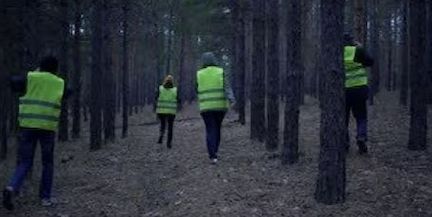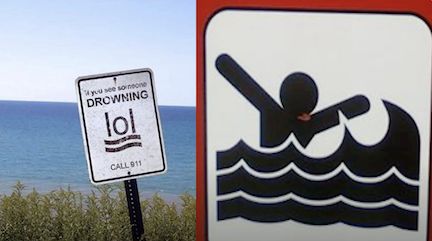Close The Book On Vengeance And Resentment
E. Stanley Jones, the great Methodist missionary and theologian, relates, “Someone once said to me, ‘I don't think you know when you are insulted.’ I replied, ‘I am not looking for insults and so I do not see them.’"
As a recipe to let go of resentments, Jones concludes, “When Jesus announced his program at Nazareth, he read from Isaiah until he came to the words the ‘day of vengeance of our God.’ Then he closed the book. You do the same. Leave the vengeance to God–use only redemptive goodwill.”
“Do not take revenge, my dear friends, but leave room for God's wrath, for it is written: ‘It is mine to avenge; I will repay,’ says the Lord” (Romans 12:19; cf. Deuteronomy 32:35).
You Need To Know You're Lost If You Want To Be Found
In 2021, a Turkish man named Beyhan Mutlu was reported missing after he wandered into a forest while drinking with friends. His wife and friends alerted authorities, and a search party was formed. Unaware that he was the subject of the search, Mutlu stumbled upon the group and decided to help them look for the "missing person." After hours of searching, he finally realized they were calling out his own name and responded, "I am here."

When he was taken aside by one of the rescuer workers to give a statement, he said, "Don't punish me too harshly, officer. My father will kill me."
One of the greatest challenges of evangelism is convincing the "lost" that they are indeed lost. So given to reiliance on our own "self"-righteousness, we find it nearly impossible to admit we actually need a Savior.
Yet the Lord persists in hunting us down, wooing us, calling our names.
"If a man has a hundred sheep and one of them wanders away, what will he do? Won’t he leave the ninety-nine others on the hills and go out to search for the one that is lost?" (Matthew 18:12, NLT).
"For the Son of Man came to seek and save those who are lost" (Luke 19:10, NLT).
Like poor Beyhand Mutlu, "We all, like sheep, have gone astray, each of us has turned to our own way ..." We're all spiritually intoxicated, staggering around in the woods not even aware that we need help.
Yet, He IS calling you! So, “Today, if you hear his voice, do not harden your hearts as [Israel] did in the rebellion" (Hebrews 3:15, NIV). They'll be no angry father awaiting you, only the warm embrace of grace from the arms of the Savior.
The Story of the Drowning Man
It is well documented that drowning doesn't always "look" like drowning. It is often silent and seemingly unremarkable. That's because of someing called The Instinctive Drowning Response.
The Instinctive Drowning Response - named by Francesco A. Pia, Ph.D. - is what people do to avoid actual or perceived suffocation in the water. And it does not look like most people would expect. There is very little splashing, no waving and no yelling or calls for help of any kind. To get an idea of just how quiet and undramatic from the surface drowning can be, consider this: It is the No. 2 cause of accidental death in children ages 15 and under (just behind vehicle accidents). What's more, of the approximately 750 children who will drown next year, about 375 of them will do so within 25 yards of a parent or other adult. In some of those drownings, the adult will actually watch them do it, having no idea it was happening. Drowning does not look like drowning.
But for those situations which are obvious enough to attract the attentiion of a potential resucuer, the act of rescue itself can be quite dangerous. According to the rescue experts at ProTraining.com,
Once a person shows signs of drowning, there is very little time left in which to rescue them. That said, do not jump into the water to save a drowning person unless you have been specifically trained to do so and you are certain that it is safe.
A person who is drowning will panic and grab onto anything they can — including an intended rescuer. The last thing you want is for them to drag you down under the water with them.

To that point, Watchman Nee once shared an incident about a man who was drowning in a river. There were several people standing by, but none of them knew how to swim, except for one strong swimmer. However, despite the drowning man's desperate cries for help, the swimmer did nothing but stand by the shore, watching the struggle. The crowd became anxious and started shouting at the swimmer, urging him to go and save the man.
After a few moments, when the drowning man was just about to go under and could no longer struggle, the swimmer finally jumped into the water and swiftly rescued him. Once the man was brought to safety, someone from the crowd angrily asked the swimmer why he waited so long to act.
The swimmer calmly explained, "If I had jumped in earlier, the man would have been thrashing around in his panic, and both of us could have drowned. I had to wait until he was exhausted and no longer trying to save himself. Only then could I rescue him without risking both our lives."
Watchman Nee used this story to illustrate a powerful spiritual lesson. In our relationship with God, we often rely too much on our own strength, effort, and wisdom to solve problems or overcome challenges. We try to take control of situations and work things out on our own. However, true faith requires us to surrender our self-effort and acknowledge our helplessness.
Only when we stop struggling and trying to save ourselves can God step in and work in our lives. Just like the swimmer had to wait for the drowning man to stop fighting, God often waits for us to come to the end of our own strength. It's only then, when we fully depend on Him, that His power can be made perfect in our weakness.
This story teaches the importance of letting go of our reliance on ourselves and learning to trust completely in God's ability to save, guide, and provide for us.
But he said to me, “My grace is sufficient for you, for my power is made perfect in weakness.” Therefore I will boast all the more gladly about my weaknesses, so that Christ’s power may rest on me.That is why, for Christ’s sake, I delight in weaknesses, in insults, in hardships, in persecutions, in difficulties. For when I am weak, then I am strong" (2 Corinthians 12:9-10, NIV).